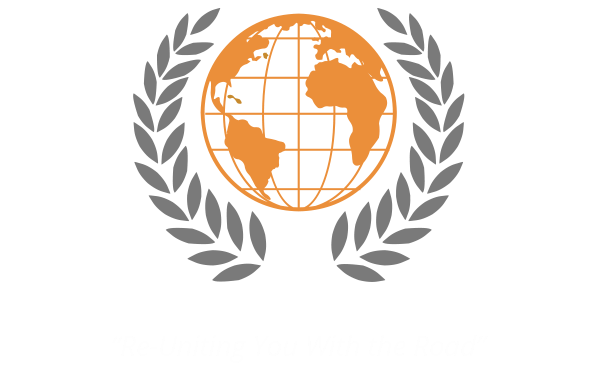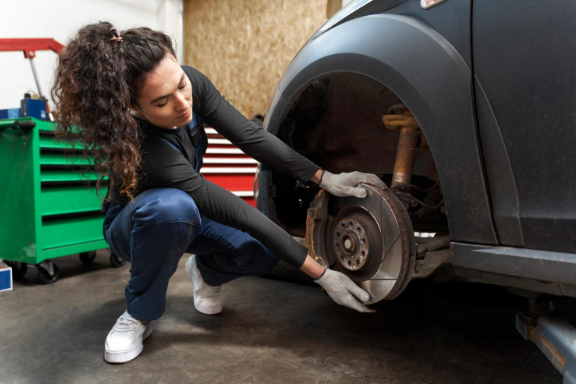Introduction
Your brakes are one of the most important parts of your car. Every time you come to a stop sign or traffic light, you’re counting on them to work. That’s why it’s so important to catch brake problems early. When something feels off, it could mean there’s more going on under the surface than you think. Putting off brake repairs might not seem like a big deal, but it can quickly lead to unsafe driving and bigger repair bills.
Brake issues in a pre-owned car can happen for a lot of reasons. Maybe the parts are worn down over time, or the car simply hasn’t been serviced as often as it should’ve been. Certain warning signs will tell you when it’s time to get your brakes checked. Recognizing them is the key to staying safe behind the wheel and avoiding avoidable stress later on.
Recognizing Brake System Warning Signs
Every driver feels that extra sense of safety when they know their brakes are in good shape. But how do you know when there’s a problem? The car doesn’t always shut down or flash every warning light right away. Sometimes, it’s the little signs that matter most.
Keep an eye and ear out for these common warning signals:
- A squealing or grinding sound when you press the brake pedal
- A brake warning light glowing on your dashboard
- A brake pedal that feels soft, spongy, or sinks too far when you press it
- Vibration or pulsing in the brake pedal
- The car pulling to one side when braking
- A burning smell during or after driving
Each of these signs points to something that’s not working quite right. For example, if your pedal feels weaker than usual or takes longer to stop the car, that could mean a problem with the brake fluid or even a brake line issue. If you're hearing squeaks or grinding, your brake pads might be worn down past the safe limit. And if your car pulls to the left or right when braking, you could have uneven wear or even a sticking caliper.
One example: someone driving in a quiet neighborhood may suddenly hear a high-pitched squeal when slowing down for a stop sign. At first, it seems small, but after a few days, the sound becomes louder and sharper. That’s often how a simple brake pad issue starts, and it will only get worse if ignored.
Listening to what your car is trying to tell you can save time and money. More importantly, it helps keep you and others around you safe.
Common Brake Problems And Their Causes
Brake systems do a lot of work every time you drive. Over time, that work can wear down parts and lead to problems. Knowing what those common problems are and what might cause them can make it easier to catch issues early.
Here are a few examples of brake problems and their likely causes:
1. Worn brake pads – These are one of the most frequent brake issues. Pads wear down with normal use, but they can wear faster with heavy braking or stop-and-go driving. When they get too thin, they don’t stop the car as well, and that’s when you’ll start to hear squeaking or scraping.
2. Warped rotors – Rotors are the discs that the brake pads press against to slow the wheels. If they overheat, they can warp, making it harder to stop the car smoothly. This often causes shaking or vibration when you brake.
3. Leaking brake fluid – Brake fluid is what applies pressure in the braking system. When there’s a leak, the brakes may feel soft, and your stopping power drops fast. Leaks can happen at the brake lines, calipers, or even the master cylinder.
4. Sticking calipers – When calipers stick, they can cause uneven wear on the brake pads and make your vehicle pull to one side. This not only shortens the life of your pads but can also make your braking less predictable.
5. Worn or broken brake lines – Older brake lines can weaken or rust over time, especially in areas with rough weather or poor roads. When lines start to crack or leak, the entire braking system is at risk of failing.
These problems often develop slowly, but they can quickly take a toll on how your car performs. Recognizing the source gives you a solid head start on fixing the issue before it gets worse.
The Importance Of Regular Brake Inspections
Brake problems don’t always show up with a big, obvious warning. Sometimes, it’s quieter signs that creep up over time. That’s why regular brake inspections are one of the smartest things you can do as a car owner, especially if you’re driving a used vehicle. Just like getting your oil changed or your tires rotated, inspecting your brakes should be part of your routine car care.
A brake inspection isn’t just someone glancing at the wheels. A full checkup usually includes looking at the pads, rotors, calipers, brake lines, and fluid levels. Technicians will also look for rust or corrosion and test how the brakes respond during normal pressure. If anything looks worn or behaves in a way that doesn’t match factory standards, they’ll let you know what needs attention.
Think of it like this: you might have enough brake pad left according to the wear indicators, but if one side is more worn than the other, it might point to a deeper issue like an uneven caliper or bad alignment. These are the sorts of things a trained eye can catch early, saving you from bigger, more expensive problems later.
It’s also a good idea to have your brakes checked before a long trip or at the start of a season change. For folks in Saluda, dealing with wet road conditions in fall or slick sidewalks in winter means your brakes need to be in great condition. You don’t want to find out they’re weak in the moment you need them most.
Getting your brakes looked at regularly adds a layer of safety and peace of mind. You might not think about it every day, but that kind of routine upkeep is what keeps your drives smooth, quiet, and stress-free.
Why Professional Brake Maintenance Matters
There are some things worth leaving to the experts, and brake work falls firmly in that category. You depend on your brakes to perform the same, rain or shine, every day you drive. When something is off, even just a little, it can mess with your stopping distance or make the car harder to handle. A professional has the experience to spot small issues before they become major risks.
One big benefit is the tools and training used to inspect and repair your braking system. A qualified technician knows how to test all the components properly and install replacement parts in a way that’s safe and reliable. That’s not always possible when cutting corners or trying to figure it out on your own.
Here’s why visiting a brake specialist is smarter than rolling the dice:
1. They know the difference between normal wear and dangerous damage
2. They follow manufacturer guidelines for torque, part placement, and testing
3. They’ll check for issues you might not even think to ask about, like how your rotors are wearing or whether your brake fluid is aging out
4. They can balance the braking system as a whole, not just fix one part at a time
One driver in Saluda had been hearing a light grinding noise for weeks but didn’t think much of it. After taking the car in, the tech found that one brake pad had worn away completely, and the metal-on-metal rubbing had already damaged the rotor. That turned what could have been a quick fix into a longer, more costly repair. Acting earlier would’ve meant less expense and a safer vehicle.
A simple brake service now can help prevent that kind of thing. Whether it’s a fluid flush, pad replacement, or rotor resurfacing, these services help your car stop the way it should. That peace of mind isn’t something you want to gamble with.
Staying Safe with Strong, Responsive Brakes
Taking care of your brakes isn't complicated, but it does take a little attention now and then. The good news is that once you get into the habit, it becomes easier to spot when something’s out of place or starting to wear down.
Here’s what you can do to help your brakes last longer:
- Pay attention to new sounds, smells, or sensations when braking
- Don't ride your brakes continuously on hills
- Make smooth, steady stops instead of slamming the pedal
- Schedule regular inspections based on your car’s needs
- Keep your tires in good shape since bad tires make your brakes work harder
- Avoid carrying heavy loads for long periods unless your vehicle is designed for it
Driving habits also play a big role. Coast a little before braking when you can, and try to keep a safe distance from the car ahead to avoid constant sudden stops. That small change takes a big load off your brake system over time.
Look out for road conditions too. If you’ve been through a lot of standing water or salty roads, salt and moisture can get into brake parts and cause corrosion. A quick inspection after those conditions goes a long way.
When you give your brakes the attention they need, you're really looking out for everyone on the road. Good brakes can be the difference between a smooth stop and a close call. And for drivers in Saluda where quiet neighborhoods and busy intersections meet, staying on top of brake maintenance helps keep every drive safer and more predictable.
For anyone wanting the peace of mind that comes with well-maintained brakes, regular check-ups are key. United Auto Sales Saluda is here to help. As a leading pre-owned car dealer, we offer top-notch service that ensures your brakes perform their best, no matter what. Get in touch today and let us keep your rides smooth and safe.



